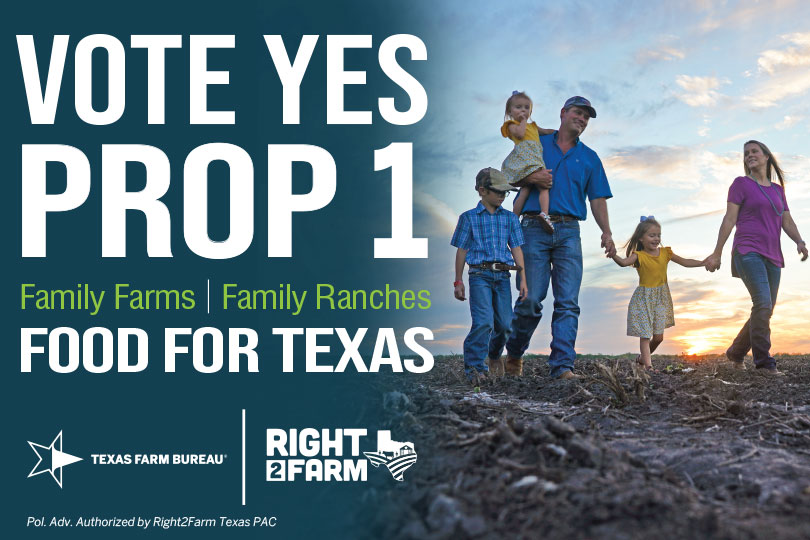By Julie Tomascik
Editor
Food—it’s a simple connection that all Texans share, and it’s rooted in agriculture.
The rich tradition of farming and ranching ensures a safe and abundant food supply for generations to come. But urban sprawl and local government regulations could jeopardize the future of some family farms and ranches in Texas.
That’s why Texas Farm Bureau (TFB) and other agricultural organizations are encouraging Texans to support Proposition 1—the right to farm and ranch constitutional amendment on the November ballot.
“Proposition 1 aims to protect the families behind our food and the future of food security in the state,” TFB President Russell Boening said. “This is a once-in-a-generation opportunity to positively impact our state, the future of agriculture and the future of food for our families.”
It’s necessary to enshrine the right to farm and ranch in the state constitution, Boening said, as Texas grows increasingly urban. Over the last 25 years, the state population has grown by more than 11 million people. During that same time, over 2 million acres of agricultural land have been lost.
With the Texas population expected to continue growing, adding an estimated 13 million over the next two decades, Proposition 1 becomes even more important. It ensures the land, natural resources, livestock and wildlife are protected, too.
The survival of family farms is vital in today’s changing agricultural landscape.
“Less than 2% of the U.S. population farms and ranches. That number grows smaller each year,” Boening said. “Just like our other constitutional rights, Proposition 1 will protect the minority—Texas farmers and ranchers—to ensure we can continue to feed the majority. That’s why we need to preserve these rights in the Texas Constitution.”
Family farms and ranches also promote the economic health of the state. In fact, one in seven Texans has a job related to the food and fiber sector.
But radical activist groups and onerous overregulation from local governments can deflate that economic progress and force family farmers out of business.
There are several examples in the Dallas-Fort Worth area where cities are using their public nuisance ordinances to prohibit agricultural activities. In one city, grass grown for hay is not allowed to grow taller than 12 inches without the city mowing the property and sending the bill to the farmer.
In another city, a produce company purchased farmland to grow organic vegetables. After purchasing the property, the city informed the vegetable grower that its zoning did not allow agricultural use of the property in the future. The grower filed for a zoning variance and was denied.
“Those are just a few of the stories Farm Bureau members have shared,” Boening said. “As more and more of Texas’ agricultural lands are developed, it’s so important that we work together to make sure farmers and ranchers are able to continue doing what we do best—growing our food and fiber.”
And those burdensome regulations led by activist groups could be costly to consumers and increase the reliance on food produced out of state and in foreign countries.
But passing Proposition 1 would give farmers—old and new—the opportunity to establish roots or continue an agricultural legacy on lands that would otherwise be covered in cement or pavement.
“Proposition 1 is about our food, our farm families and all Texans, because agriculture touches everything we do every day. There’s nothing more basic than the right to feed ourselves,” Boening said. “That’s why I encourage you to support the farm and ranch families of Texas by voting yes for Proposition 1.”
Family farms and food for Texans—it’s worth protecting in the Texas Constitution.


Does prop 1 protect individuals that wish to have chickens? Meaning, ratified in constitution would limit hoas and local municipalities from prohibiting owning chickens?
Prop 1 protects generally accepted farm practices. Whether or not the property where the practice is being used qualifies is a grey area when it comes to property used primarily as a residence. It is something that the courts will likely have to decide. If the courts believe it does qualify, then the city would have to provide clear and convincing evidence that keeping chickens is an imminent danger to the public to prohibit keeping chickens.